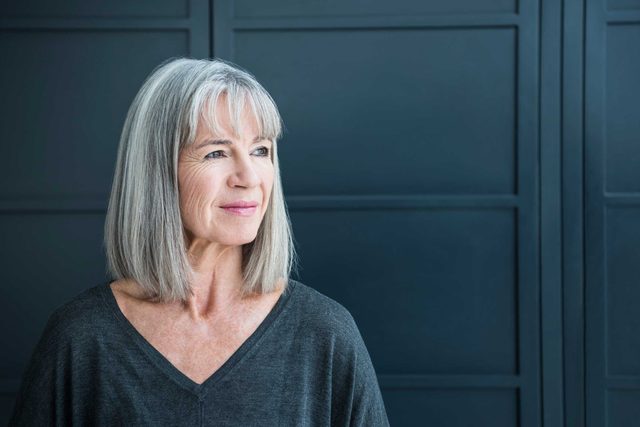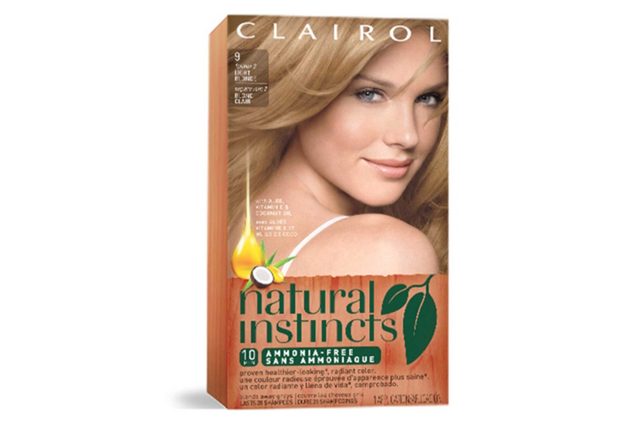What Is Responsible for the Color of Gray Hair
Ready to Go Gray? 13 Things that Happen When You Stop Coloring Your Hair
From the first sign of a gray strand, many of women run straight to their colorist. And so the cycle begins. But a growing number of women are choosing to embrace the next stage in their life by going au naturel. Ready to ditch the hair dye? Read on to find out what to expect and how to go gray gracefully.
 iStock/JohnnyGreig
iStock/JohnnyGreig
When should you go gray?
It's a personal decision that varies based on the individual. As a general rule, Mike Liang, advanced colorist at Julien Farel Restore Salon & Spa in New York suggests going gray when you reach 80 percent non-pigmented or white hair. If your hair starts to feel increasingly dry, brittle, or damaged or you experience scalp irritation, it might be time to ditch the dye. These are the sneaky reasons your hair is going gray too soon.
 iStock/dolgachov
iStock/dolgachov
You might save money
Whether you book an appointment with your colorist for highlights, all-over color correction, or root touch ups—or opt for a more budget-friendly at-home alternative—maintaining colored locks costs money. When you stop dyeing hair you can save hundreds, even thousands, of dollars each year. Check out these ways to get gorgeous hair without expensive products.
 via clairol.com
via clairol.com
Your hair might go through an awkward stage
Growing out your color is a process and it requires some patience, especially during that awkward, in-between stage (the first two to three weeks). Luckily, there are a few techniques to ease the transition without committing to permanent color. James Corbett, color director of Clairol, recommends using a semi-permanent gloss, like Clairol Natural Instincts, to help ease into the growing out stage or opting for subtle highlights to make the line of demarcation less noticeable. Alternately, you can try a few highlights around your face to brighten up your overall look or a root touch-up spray for a quick fix (it washes out). If you have red hair you'll never go gray. These are other facts about redheads we bet you never knew.
 iStock/AleksandarNakic
iStock/AleksandarNakic
Your hair may look thinner
According to Corbett, color makes hair look thicker for two reasons: It swells the cuticle, giving each strand more volume, and it creates the illusion of depth and light, which makes hair look like it has more body. So when you stop coloring your hair may have a noticeable loss of actual volume and the appearance of it.
 iStock/YakobchukOlena
iStock/YakobchukOlena
You might want to change up your makeup
Hair color brightens up your skin tone. When you take a hiatus from color your skin can look a bit dull and you may feel like you need more makeup. "Especially when you have gray hair coming in, you may find yourself wanting a bright lip or a bold eye to really bring out your features," explains Corbett.
 iStock/adrian825
iStock/adrian825
Your hair texture will change, for better or worse
"Depending on your natural hair texture, strands can become coarser or more fragile as you go gray," explains Liang. "Hair color can be good for your hair texture, as the fatty lipids in it can mean less flyaways and frizz." Corbett says. "On the flip side, hair might feel better and stronger if it's been damaged with color." Check out these genius ways to tame frizzy hair.
 via julienfarel.com
via julienfarel.com
You need to find the right products
When it comes to going gray, it's important to do your research and look for shampoos and conditioners with hydrating ingredients. Liang recommends Julien Farel Hydrate Shampoo, which is infused with hyaluronic acid, a moisture-loving molecule that holds 1000 times its weight in water. You'll also want to reconsider your styling products. "After you stop coloring, you may need to use pomade, mousse, or texturizing sprays to give hair more texture and body," says Corbett.
 via viviscal.com
via viviscal.com
You might want to consider a supplement
Taking hair growth supplements, such as Viviscal or Nutrafol, may speed up the process. Liang notes that once you stop, you will see that hair will revert back to its original state. So continued use is necessary to maintain results. Here, more tips to help your hair stay healthy.
 iStock/vgajic
iStock/vgajic
You may start a new workout routine
We associate gray hair with getting older, so when you embrace your natural hue, there's no question that it can make you feel older. "Some women will look for other ways to feel young, like picking up a new workout routine," says Corbett.
 iStock/Jitalia17
iStock/Jitalia17
You might feel the urge to change your wardrobe
"Sometimes a change in color can mean rethinking your entire look," explains Corbett. Hair color can be a big part of your image, especially if you identify with a signature shade. "You may find that statement necklaces or bolder fashion choices make you feel like yourself again." Read up on the style secrets of women who always look put together.
 iStock/stock_colors
iStock/stock_colors
You may want a new hair cut
"When women embrace their natural shade, they often want a more bold or sophisticated style to maintain a look that reflects their personality and this new chapter in their life," says Corbett. And yes, you can still wear long hair after 40, but you should avoid these hairstyling mistakes that make you look older.
 iStock/Jacoblund
iStock/Jacoblund
You may find it freeing
For many women quitting color can be very liberating! "It allows them to embrace a new 'I've gone gray and I feel great' attitude," says Corbett.
Originally Published: December 01, 2016
![]()
Sign up for articles sent right to your inbox
Enjoy the best stories, advice & jokes delivered right to your inbox!

Subscribe & SAVE Save Up To 84%!
What Is Responsible for the Color of Gray Hair
Source: https://www.rd.com/list/gray-hair-color/